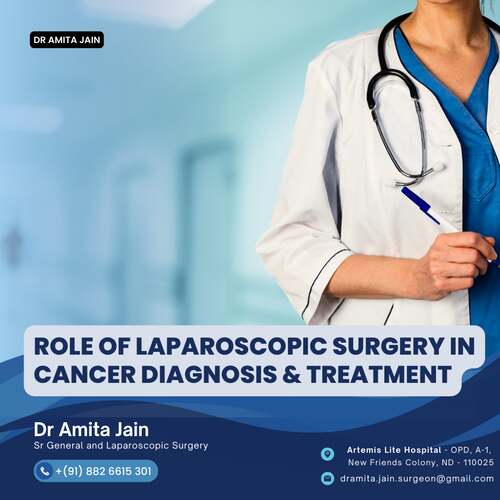Hearing the word “cancer” often brings fear and uncertainty, but recent medical advancements provide hope. One such advancement is laparoscopic surgery, a minimally invasive technique that is changing how cancer is diagnosed and treated. Unlike traditional open surgeries, laparoscopy involves making small incisions and using a laparoscope—a thin, lighted tube with a camera—to view internal organs with precision. This approach has reduced patient pain, minimized blood loss, shortened hospital stays, and lowered postoperative complications.
Initially used for diagnostic purposes, laparoscopy has become a key therapeutic tool in oncology. Continuous improvements in surgical tools and imaging have enhanced its effectiveness, making it a less invasive alternative to traditional open surgeries. This shift has led to better patient recovery and less physical and emotional strain, significantly transforming cancer care.
What Forms of Cancers are Treated with Laparoscopy?
Laparoscopy has proven useful in diagnosing and treating various cancers explains Delhi and Gurgaon’s one of the top laparoscopic surgeons Dr Amita Jain in this blog.
Gynecological Cancers:
- Ovarian cancer
- Endometrial cancer
- Cervical cancer
Digestive System Cancers:
- Esophageal cancer
- Gastrointestinal cancer
- Colon cancer
- Rectal cancer
Other Cancers:
- Kidney cancer
- Bladder and prostate cancers
- Mediastinal tumors
- Lung tumors
How Cancer is Diagnosed Through Laparoscopy?
Diagnostic Laparoscopy: This procedure allows surgeons to directly observe the abdominal and pelvic cavities. It helps in detecting abnormal growths, such as tumors or cysts, and distinguishing whether they are cancerous. By closely examining tissues and organs, surgeons can take biopsy samples, which are essential for confirming a cancer diagnosis and planning treatment. Laparoscopy also identifies suspicious areas, like lymph nodes, that may need further analysis to check for cancer spread.
Staging Laparoscopy: This plays a vital role in determining how far cancer has spread within the body. By evaluating the peritoneal surfaces, liver, lymph nodes, and other abdominal structures, surgeons can gain crucial insights about cancer metastasis. Accurate staging is particularly important in cancers like ovarian, gastric, and pancreatic, where understanding the cancer’s spread is key to crafting an effective treatment strategy. This precise assessment allows for tailored treatment plans, improving patient outcomes.
Laparoscopic Treatment for Cancer
Laparoscopic cancer surgery involves small incisions, typically 4-5 mm, on the abdomen. A high-resolution camera is inserted through one incision, offering a magnified view of the internal organs on a monitor. Using thin, specially designed instruments, the surgeon performs the operation through the other incisions. The affected organ tissue, along with nearby lymph nodes, is carefully removed. This method results in reduced pain, quicker recovery, and less blood loss compared to traditional open surgery.
Pros and Cons of Laparoscopic Cancer Treatment
Pros:
- Minimal Invasiveness: Small incisions lead to reduced bleeding, less postoperative pain, and quicker recovery.
- Lower Complication Risk: The procedure has a lower chance of infections, hernias, and scarring.
- Faster Healing: Patients can often be discharged earlier, return to normal activities sooner, and experience better cosmetic outcomes due to smaller scars.
- Less Blood Loss: The reduced need for transfusions is another significant advantage.
Cons:
- Specialized Skills Required: Surgeons need extensive training due to the limited range of movement and the challenges of operating through tiny incisions.
- Potential Risks: Although generally safer, there are risks such as infection, allergic reactions, and accidental damage to surrounding organs.
- Not Suitable for All Cases: Laparoscopy may not be appropriate for all cancer types, especially if the tumor is large or located in a difficult-to-reach area.
- Risk of Tumor Spread: There is a small risk of cancer cells spreading through the incision sites.
Laparoscopic surgery has undeniably revolutionized cancer diagnosis and treatment. Its benefits—minimal invasiveness, quicker recovery, and fewer complications—make it a valuable tool in oncology. However, it may not be suitable for every patient or cancer type. When applicable, it offers significant improvements in patient care, enhancing both physical recovery and overall treatment outcomes.

Dr Amita Jain is one of the most experienced and highly skilled general and laparoscopic surgeons in Delhi and India. Known for her exceptional surgical precision and patient-first approach, she offers expert care across a wide range of procedures, using both open and minimally invasive techniques to ensure faster recovery and better outcomes. Dr Amita Jain holds 28 plus years of rich experience in Trauma and General Laparoscopic Surgeries (including Gallbladder stone removal, appendix removal, hernia repair surgery, piles and fissure surgeries). She was the Professor Surgery of at the Army College of Medical Sciences. In 1994 she was commissioned as Surgeon under the United Nations Mission in Congo. From 2020 to 2022, she worked with Bansals Hospital. Currently, Dr Amita Jain is the Sr. General and Laparoscopic Surgeon at Rainbow Children Hospitals, Malviya Nagar, Delhi.
As a top female surgeon in Delhi, Dr Amita Jain brings decades of experience, compassion, and a commitment to surgical excellence. She has undergone advanced training in trauma surgery and has successfully performed numerous complex procedures, including life-saving surgeries, vascular repairs, mangled limb reconstructions, and critical care surgeries. Whether it’s a planned surgery or an emergency situation, patients across Delhi trust Dr Amita Jain for her expertise, integrity, and results-driven approach to general and laparoscopic surgery.
Call Us at +(91) 882-6615301
